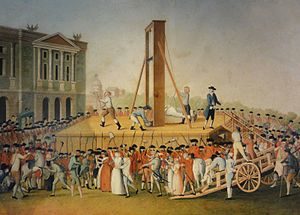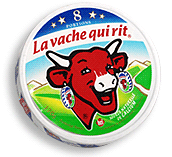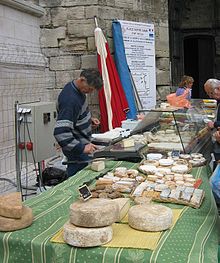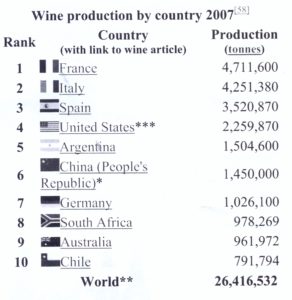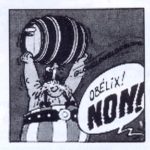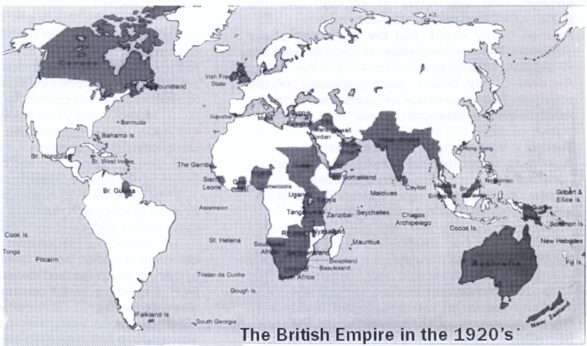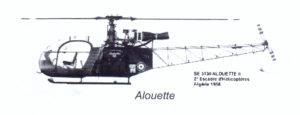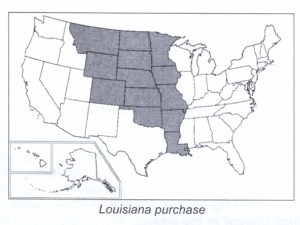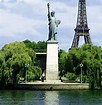TEN PROPHETIC CLUES CONCERNING REUBEN
There is no direct history connecting the tribe of Reuben to the French people. We are talking about one of the lost tribes. Even the French Caucasian population comes from various backgrounds. One can” compare this with Jewry. The Jewish people have known many proselytes , yet, there has been a core of the tribe of Judah (and some of Levi & Benjamin) over the past 2500 years . The core passes on characteristics and genes to the periphery. Looking at the ‘prophetic clues’, one has to conclude that a core of the tribe of Reuben once found its way to the two northern thirds of (Celtic) France. This core passed on its characteristics and genes to the influx of others. Just to make it easy we will talk about the French, although the southern third of France (le Midi) most likely does not belong to the lost tribes. The more fulfilled prophetic clues we find, the stronger our case. What follows is not historic proof, but proof by revelation.
1st Clue: Reuben: See, a son!
And when the LORD SAW (va-yar), that Leah was hated, he opened her womb: but Rachel was barren. And Leah conceived, and bare A SON (ben), and she called his name REUBEN (r’eu-ben – see, (a) son): for she said, Surely the LORD hath LOOKED (ra’a) upon my affliction; now therefore MY HUSBAND (my man, ishi ) will love me (Gen 29:31-32 , KJV throughout , unless mentioned otherwise).
Leah was unloved. Jacob loved Rachel and not Leah. However, Leah became pregnant and gave birth to a son. Now my man will love me, for I gave him a man, she thought.
Having a son was very important in antiquity. A son is a ‘man’. It makes a father of Jacob and turns him into even more of a man than he already was. He now had a son, a man, an heir. The name ‘see (the) man’, Reuben, emphasizes the maleness of the child, therefore ‘my man’ (ishi) will love me, said Leah.
Reuben’s Coat of Arms: a man
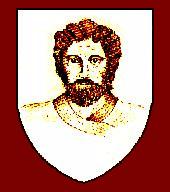
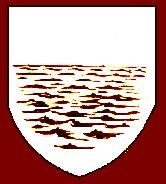 There are two traditional emblems for the tribe of Reuben. Water, because he would be unstable as water (Gen 49:3-4) and ‘a handsome man’ because of his name: See a son! Reuben!
There are two traditional emblems for the tribe of Reuben. Water, because he would be unstable as water (Gen 49:3-4) and ‘a handsome man’ because of his name: See a son! Reuben!
This can be noticed among the French. It is certainly true for the French: See the man! See the son! See the heir! See the grandson! The French are a people with many handsome men.
Reuben was the firstborn and in principle had the right to all the blessings promised to Abraham, Isaac and Jacob. He was a man and he was the firstborn. Reuben was once destined to be the future leader of the tribe.
Chauvinistic People
This manliness can be seen among the French, as so many of them are very chauvinistic . Being full of being French, great pride in self and in French language and culture, haughtiness at times and even arrogance.
I worked in a French kitchen for a while some time ago and I was surprised by the excessive national pride of the other male staff. The chef and the patissier were communists, but in discussing foreign politics they were as nationalistic as the rest of them: General the Gaulle, (right-wing), that was a man! He said No! to the English!
France is extremely fond of grandeur and honneur . Chauvinistic is not a dirty word in France. Vive la France! – Let Reuben live …and let not his men be few (Deut 33:6).
2nd Clue: Reuben: l’amour, sex & love triangle
Now at the time of the grain-cutting, REUBEN saw some LOVE-fruits in the field, and took them to his mother Leah. And Rachel said to her, Let me have some of your SON‘S LOVE-fruits. But Leah said to her, Is it a small thing that you have taken my husband from me? and now would you take my SON’S LOVE-fruits? Then Rachel said, You may have him tonight in exchange for your SON’S LOVE-fruits. In the evening, when Jacob came in from the field, Leah went out to him and said, Tonight you are to come to me, for I have given my SON’S LOVE-fruits as a price for you. And he went in to her that night (Gen 30:14-16, BBE, Bible in Basic English).
And it came to pass, when Israel dwelt in that land, that Reuben went and LAY WITH Bilhah his father’s concubine: and Israel heard it … (Genesis 35:22).
REUBEN, thou art my firstborn … thou shalt not excel; because THOU WENTEST UP TO THY FATHER’S BED; then defiledst thou it: he went up to my couch (Gen 49:3-4).
Reuben is a precocious nine year old when he finds dudayim, love-fruit , in the field. Apparently he knows about the use of the fruit and gives the love-fruit (mandrakes) to his mother Leah. In the Near East power was ascribed to Mandrakes, to arouse sex appeal and increase fertility. The Hebrew name duday – from dud, to love – reflects the use of the mandrake.
Leah swapped the love-fruit for sex with her own husband, who was with Rachel most of the time apparently. From this encounter Issachar was born.
Thinking of Reuben, sex, love, fertility and love triangle come to mind. Through deceit by Laban Jacob ends up with two women. Leah and Rachel battle for Jacob’s favours . This is the first love triangle – from this love triangle Reuben is born. Rachel has Jacob’s love, but Leah has fertility, reproduction. The story about the love-fruits – I like the vocabulary of the Bible in Basic English here – is a continuation of the love triangle between Jacob, Leah and Rachel.
Mandrake love-fruit
Reuben who is a first result of that love triangle, causes himself a new love triangle with his sexual adventure. After Rachel’s death he has sex with Bilhah, his father’s concubine .
In this Reuben is the opposite of Joseph, who refuses to have sex with Potiphar’s wife. The right of the firstborn will go to Joseph and not to Reuben (1 Chron 5:1).
Reuben’s tribe does not distinguish itself positively. The Reubenites joined the sex and dance around the Golden Calf. The tribe of Levi abstained and thus got the priesthood. Reuben also joined in the orgy for Baal-Pear in the fields of Moab. Phinehas, of Levi, showed positive behaviour … Reuben just joined in. The Reubenites missed their chances to make a difference.
Love – l’amour – la maitresse – love triangle
Over the past 500 years, there has been more acceptance of the love triangle, of having a mistress, a lover, in France, than anywhere else.
The French kings gave the example: Wikipedia: The maitresse-en-titre was the chief mistress of the king of France. It was a semi-official position which came with its own apartments. The title came into use during the reign of Henry IV and continued until the reign of Louis XV. From the reign of Louis XIV, the term has been applied, both in translation (“official mistress”) and in the original French, to refer to the main mistress of any monarch or prominent man when his relationship with her is not clandestine.
What then follows in Wikipedia is a long list of mistresses of the French kings. https://en.wikipedia.org/wiki/Maîtresse-en-titre Well-known mistresses are Madame de Montespan of Louis XIV and Madame de Pompadour of Louis XV.
Another phenomenon is the menage a trois,
Wikipedia: A menage a trois (French for “household of three”) is a domestic arrangement in which three people, having romantic and/or sexual relations with each other, occupy the same household.
Love triangles, menage a trois, having a mistress, are things that do not shock the French. Mitterand’s mistress and their daughter, and Mitterand’s wife, were all three present at his graveside, when Mitterand was buried. Not so long ago we had President Hollande, living together with one woman in the Elysee, and regularly driving off by scooter to his mistress, elsewhere in Paris.
Because of their sexual ‘sophistication ‘ many expressions have come to the English language with French, like French kiss and French letter (condom).
3rd Clue: Reuben & rebellion
Now the sons of REUBEN the firstborn of Israel, (for he was the firstborn; but, forasmuch as HE DEFILED HIS FATHER’S BED, his birthright was given unto the sons of Joseph the son of Israel: and the genealogy is not to be reckoned after the birthright ( 1 Chronicles 5:1).
Now Korah … the son of Levi, and DATHAN and ABIRAM, … SONS OF REUBEN, took men: And they ROSE UP BEFORE Moses …
And they GATHERED THEMSELVES AGAINST Moses and against Aaron … And Moses sent to call DATHAN and ABIRAM … which said, WE WILL NOT COME UP (Num 16:1-3, 12). These are the families of the REUBENITES … And the sons of Eliab … DATHAN, and ABIRAM. This is that Dathan and Abiram, which were famous in the congregation, WHO STROVE AGAINST Moses and against Aaron in the company of Korah, when they strove against the LORD (Num 26:7-9) .
And Moses said unto the children of Gad and to the CHILDREN OF REUBEN, Shall your brethren go to war, and shall ye sit here? And wherefore discourage ye the heart of the children of Israel from going over into the land which the LORD hath given them? And, behold, ye are risen up in your fathers’ stead, an increase of sinful men, to augment yet the fierce anger of the LORD toward Israel (Num 32:6-7; 14).
And when they came unto the … Jordan… the CHILDREN OF REUBEN and the children of Gad and the half tribe of Manasseh built there an altar by Jordan, a great altar to see to (Josh 22:10) … Thus saith the whole congregation of the LORD, What TRESPASS is this that ye have committed against the God of Israel, to TURN AWAY this day from following the LORD, in that ye have builded you an altar, that ye might REBEL this day against the LORD? (Josh 22:16).
Reuben and rebellion
The word rebellion sticks to Reuben and Reubenites. According to some it was not just lust why Reuben took Bilhah, his father’s concubine . It was also a deliberate attempt to take over the tribe to assert his authority.
Reubenites never distinguished themselves in a positive way. The tribe of Reuben murmered in the desert, just like the rest of Israel; the Reubenite spy also brought back a bad report; Reuben belonged to the 10 rebelling tribes of Jeroboam and also belonged to the 10 unfaithful lost tribes, which went into the Assyrian exile.
On top of that there are the rebellion of Dathan and Abiram (Num 16), the request to stay in Transjordan (Num 32) and the building of the Great Altar (Josh 22).
Their request to live in Transjordan caused them to live far away from the other Israelites. Their western border was the Jordan and the Dead Sea, on the south they bordered Moab and the desert in the east. It was only in the north that they bordered another Israelite tribe, Gad. Consequently they kept to themselves in the time of Deborah and Barak: … For the divisions of Reuben there were great thoughts of heart. Why abodest thou among the sheepfolds, to hear the bleatings of the flocks? For the divisions of Reuben there were great searchings of heart (Judg 5:15-16).
Vive la revolution!
French history and French spirit have displayed a spirit of rebellion, independence and revolt, over the past 250 years. The Gauls (Celts) also had a very independant spirit at the time of Julius Caesar.
In 2003 I wrote in Dutch about Ruben France: It seems to me that the opposition, independence and rebelliousness of the French is well-known. Without research come to mind: the strikes of May ‘68, the Commune of Paris, the 1st, 2nd, 3rd, 4th and 5th Republique, 14 juillet , 1789, the Bastille, la Marseillaise, the revolutionary years of 1830, 1848, 1870, guillotine, generale de Gaulle, Force de frappe, the leaving of NATO command.
In History of FRANCE, by Pierre Gaxotte , this spirit is even phrased in a better way: It would have been more understandable if the people would have wanted to throw off the monarchy, to replace it with something else. However,’ this something else’ was something the people were unable to stick to; it was as if the first revolution had only created the necessity to change perpetually: Absolute Monarchy, Constitutional Monarchy, First Republic, Consulate, French Empire, Restoration, July-Monarchy, Second Republic, Second Empire, Third Republic, the French State ( Vichy), Fourth Republic, Fifth Republic: in 170 years France tried out thirteen different forms of government [ !].
4th Clue: Reuben, much cattle
Now the CHILDREN OF REUBEN and the children of Gad had A VERY GREAT MULTITUDE OF CATTLE: and when they saw the land of Jazer, and the land of Gilead, that, behold, the place was A PLACE FOR CATTLE; The children of Gad and the children of Reuben came and spake unto Moses, and to Eleazar the priest, and unto the princes of the congregation, saying, Ataroth, and Dibon, and Jazer, and Nimrah, and Heshbon, and Elealeh, and Shebam, and Nebo, and Beon, Even the country which the LORD smote before the congregation of Israel, IS A LAND FOR CATTLE, and thy servants have CATTLE: Wherefore, said they, if we have found grace in thy sight, let this land be given unto thy servants for a possession, and bring us not over Jordan (Num 32:1-5).
And they came near unto him, and said, We will build sheepfolds here for our CATTLE, and cities for our little ones (Num 32:16) … Our little ones, our wives, our FLOCKS, and all our CATTLE, shall be there in the cities of Gilead (Num 32:26).
… For the divisions of Reuben there were great thoughts of heart. Why abodest thou among the SHEEPFOLDS, to hear the BLEATINGS of the FLOCKS? For the divisions of Reuben there were great searchings of heart (Judges 15b-16).
The Jordanian Highlands were the tribal areas of Gad and Reuben in Biblical times. In Jordan the desert ascends from the east to the west, to high plains with an average height of 900m above sea level, east of the River Jordan.
This steppe land has an average height of 900m above (Mediterranean) sea-level, with peaks of 1200m in the north (Gad) and 1700m in the south (Reuben). These highlands have been inhabited for 5000 years. The climate is Mediterranean with 300mm of rain in the south and 500mm, of rain in the north (Cf. Jerusalem 550mm and Paris 650mm) .
This is where the Reubenites (descendants: the French) and the Gadites (descendants : the Swiss) settled, because they had much cattle.
France is an agricultural nation and the French have much cattle. According to Eurostat there were 87 million heads of cattle in the 27 EU countries in 2010. In France there were 20 million cattle.
Boeuf – beef – steak of beef – le bifteck
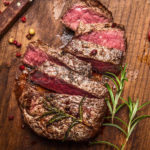 Linguistically French is also connected with the ‘flesh’ of ‘cattle’. The bull in French is le boeuf,” boeuf became beef in English; when you eat a ‘bit’, a ‘stick’ or a ‘steak’ of it, it gives a steak of beef. This became biefstuk in Dutch and the word moved back to French as le bifteck.
Linguistically French is also connected with the ‘flesh’ of ‘cattle’. The bull in French is le boeuf,” boeuf became beef in English; when you eat a ‘bit’, a ‘stick’ or a ‘steak’ of it, it gives a steak of beef. This became biefstuk in Dutch and the word moved back to French as le bifteck.
Cheese Country
All these cattle (and sheep) produce about 25 million tonnes of milk and dairy products. Much of this milk is turned into cheese. France is the most important cheese country in the World.
France produces about 2 million tonnes of cheese each year (Holland 700,000 tonnes) . There are about 300 to 400 different kinds of cheeses. According to some, one kind for each day of the year (365). In France they say ‘le pays des 300 fromages’, country of the 300 cheeses. The French see cheese as part of their national identity.
President De Gaulle once remarked about his unruly fellow countrymen: How would you rule a country where they have 246 different kinds of cheese?
French Cheese
There is a Wikipedia page with all kinds of French cheeses:
https://fr.wikipedia.org/wiki/Liste_de_fromages_francais
A number of well-known brands are: Camembert , Roquefort, Brie, la Vache qui rit, Paturain, Boursin, Beaufort, Bleu (de Bresse), Chevre (du Poitou), etc.
5th Clue: Reuben: unstable like water
Reuben, thou art my firstborn … UNSTABLE AS WATER, thou shaft not excel; because thou wentest up to thy father’s bed; then defilest thou it: he went up to my couch (Gen 49:3-4).
And Reuben heard it, and he delivered him out of their hands; and said, Let us not kill him. And Reuben said unto them, Shed no blood, but cast him into this pit that is in the wilderness, and lay no hand upon him; that he might rid him out of their hands, to deliver him to his father again (Gen 37:21-22) … And Reuben returned unto the pit; and, behold, Joseph was not in the pit; and he rent his clothes. And he returned unto his brethren, and said, The child is not; and I, whither shall I go? (Gen 37:29-30).
And Jacob their father said unto them, Me have ye bereaved of my children: Joseph is not, and Simeon is not, and ye will take Benjamin away: all these things are against me. And Reuben spake unto his father, saying, Slay my two sons, if I bring him not to thee: deliver him into my hand, and I will bring him to thee again (Gen 42:36-37).
And Moses said unto … the children of Reuben, Shall your brethren go to war, and shall ye sit here? And wherefore discourage ye the heart of the chilren of Israel from going over into the land which the LORD hath given them? (Num 32:6-7).
And when they came unto the borders of Jordan … the children of Reuben and the children of Gad … built there an altar by Jordan, a great altar to see to (Josh 22 :10).
… For the divisions of Reuben there were great thoughts of heart. Why abodest thou among the sheepfolds, to hear the bleatings of the flocks? For the divisions of Reuben there were great searchings of heart (Judges 15b-16).
And Mesha king of Moab was a sheepmaster, and rendered unto the king of Israel an 100,000 lambs, and an 100,000 rams, with the wool. But it came to pass, when Ahab was dead, that the king of Moab rebelled against the king of Israel (2 Kings 3:4-5).
Plans …
Some of these verses were already used in the rebellion chapter, but here they are again with a different emphasis. Reuben is full of passion, impetuous, uncontrollable … unstable like water. Reuben often comes with doubtful or less successful plans.
Reuben’s plan to save Joseph by having him thrown into a dry well backfired. His offer to have his two sons killed (Jacob’s grandsons!) if he did not return with Benjamin was quite absurd.
The plans of the Reubenites Dathan and Abiram to become leaders in Israel utterly failed. The plans to stay in Gilead and the building of the Great Altar barely came to a good conclusion. Deborah’s call to the arms was met with indecisiveness.
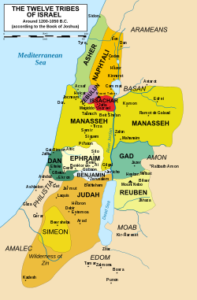 Settling in Transjordan, in Gilead, had great disadvantages. Reuben was tucked away, across the River Jordan, behind the Dead Sea, far away from the other tribes.
Settling in Transjordan, in Gilead, had great disadvantages. Reuben was tucked away, across the River Jordan, behind the Dead Sea, far away from the other tribes.
When king Mesha rebelled against the House of Israel he conquered the tribal area of Reuben (around 835 BC). This can be read on the Mesha Stele or Moabite Stone, found in 1868 (The Mesha Stele is in the Louvres Museum in Paris!). So living far away from the other tribes was not such a good plan either. The Reubenites were under Moabite control. At the time of Isaiah all of the tribal area of Reuben had become part of the Kingdom of Moab (Isaiah 15-16).
Futile plans …
There have been a few futile French plans as well. Above we saw that France had thirteen forms of government in 170 years. This answers the phrase, unstable like water. Stability can be a great blessing for a people. Instability most often is a curse.
Many French plans backfired. Louis XIV wanted France to be vast and great and wanted the Rhine to be the national border of France. He waged war all his life. The rest of Europe turned against him and most of his plans came to nothing in the end. He set the stage for three centuries of fighting over Alsace-Lorraine .
Many of the plans of the Revolution (1789) came to nothing, the French even tried to abolish the week. They split up the months into three decades ( 10 days), after twelve months of 30 days there were 5 loose days to finish off the year. This Republican French Calendar was in use from 1793 to 1805.
They also invented decimal time, another impractible plan. The day would have 10 hours, each hour 100 minutes and each minute a 100 seconds.
Napoleon eventually got rid of most of the fruitless plans of the revolution and fought for the glory of himself and France by conquering Europe. Also unprofitable, in the end all conquests were lost to France. What remained was the 5 million dead of all the Napoleonic wars. The French still see him as their great hero and have built him a great tomb.
France was humiliated in 1870-1871 when the Prussians (Germans) beat them in a short war and retook Alsace Lorraine.
This led to another hollow French plan: French revanchism. For 43 years French politics were dominated by revanchism, to make war with the German Empire, win and retake Alsace-Lorraine (1871-1914). They had their way. It led to World War I and consequently to 10 million dead. The War was ended by the fateful Peace of Versailles, which in turn led to World War II. The French would not listen to (moderate) president Wilson of the USA and they humiliated the Germans needlessly .
Doctor Guillotin improved the machine, so people would die a more humane death. From that moment on the guillotine executed people like a conveyor belt.
The French Non! of Charles de Gaulle towards the British was unnecessary and only slowed down history. Chirac’s nuclear testing was not needed. The Union for the Mediterranean of Sarkozy is an empty shell.
The Vichy Regime of Petain was a disaster and led to close cooperation with Nazi Germany.
Gaxotte states in History of FRANCE, page 102, We have to admit that France sometimes developed itself, in spite of the anarchistic tendencies of the French.
6th Clue: Reuben, wine!
And the children of Reuben built HESHBON, and Elealeh, and Kirjathaim, And Nebo, … and SHIBMAH: and gave other names unto the cities which they builded (Num 32:37-38).
And Moses gave unto the tribe of the children of Reuben inheritance according to their families. And their coast was from Aroer, that is on the bank of the river Arnon, and the city that is in the midst of the river, and all the plain by MEDEBA [Madaba in Jordan]; HESHBON, and all her cities that are in the plain; Dibon … and SIBMAH, … (Joshua 13:15-19).
For the fields of HESHBON languish, and the VINE of SIBMAH: the lords of the heathen have broken down the PRINCIPAL PLANTS thereof, they are come even unto Jazer, they wandered through the wilderness: HER BRANCHES are stretched out, they are gone over the sea. Therefore I will bewail with the weeping of Jazer the VINE of SIBMAH: I will water thee with my tears, O HESHBON, and Elealeh: for the shouting for thy summer fruits and for thy HARVEST is fallen (Isaiah 16:8-9).
O VINE of SIBMAH, I will weep for thee with the weeping of Jazer: THY PLANTS are gone over the sea, THEY REACH EVEN to the sea of Jazer: the spoiler is fallen upon THY SUMMER FRUITS and upon THY VINTAGE (Jer 48:32).
Jordanian Wine
Some time ago I watched an interview on CNN with an Arab viticulturist Omar B. Zumot, nearby Jordanian Madaba (Medeba of the Bible). He was the first viticulturist in Jordan. They were making wine in the tribal area of Reuben!
From their website:
http://zumot–wines.com/ourPassion.php
“When my father, Bulos Zumot, first started his business as a vintner in 1954, he had a dream. His dream was to give Jordan its niche on the map of world-class, quality wine. Though Jordan was one of the few to claim biblical origins for wine, it was nowhere on the world wine map. Local wineries made their wines using normal grapes resulting in sub-standard quality. The dream came to life in a patch of land in Madaba, near the historical Saint George Church, where we started growing the first wine grapes in Jordan. Adopting a ‘human-free’ growing policy, we decided to let nature take the lead. In our three main viticulture areas, no pesticides or artificial nutrients were used for over 13 years. Instead nature balanced itself and gave us its exceptional bounty: Wines rich with flavor, depth, and complexity. To us, nature is the true Winemaker, and wine is our passion.”
When I saw this interview I did not know yet about Sibmah’s and Heshbon’s notoriety for wine. Wouldn‘t it be great if I could link up Reuben with wine in the Bible?, I thought. And then in writing about king Mesha (in the 5th clue) I discovered the viticulturist notoriety of Reubenite towns like Heshbon and Sibmah. And it is not just another mention of many.The Reuben tribal area, with Heshbon and Sibmah, are the only area and towns specifically mentioned with wine, with vinyards. They were famous for it in Israel!
Another indication: Reuben’s 4th son was named Carmi, which means my vineyard.
Wine production by country 2007
France is a wine country, it is the wine country of the world. The French have a long viticultural tradition. Often they are the biggest wine producer (some years Italy is biggest) and they have many different kinds of wines. Their long tradition in winemaking has led to very high standards.
https://en.wikipedia.org/wiki/French_wine
French wine is produced all throughout France, in quantities between 50 and 60 million hectolitres per year, or 7-8 billion bottles. France is one of the largest wine producers in the world. French wine traces its history to the 6th century BC, with many of France’s regions dating their wine-making history to Roman times.
The wines produced range from expensive high-end wines sold internationally to more modest wines usually only seen within France …
Reforms – The wine classification system of France has been under overhaul since 2006, with a new system to be fully introduced by 2012. The new system consists of three categories rather than four,
since there will be no category corresponding to VDQS from 2012. The new categories are:
Vin de France, a table wine category basically replacing Vin de Table, but allowing grape variety and vintage to be indicated on the label.
Indication Geographigue Protegee (/GP), an intermediate category basically replacing Vin de Pays.
Appellation d’Origine Protegee (AOP), the highest category basically replacing AOC wines …
Wine styles … All common styles of wine – red, rose, white (dry, semi-sweet and sweet), sparkling and fortified – are produced in France. In most of these styles, the French production ranges from cheap and simple versions to some of the world’s most famous and expensive examples. An exception is French fortified wines, which tend to be relatively unknown outside France …
If there is one thing that most French wines have in common, it is that most styles have developed as wines meant to accompany food, be it a quick baguette, a simple bistro meal, or a full fledged multi-course menu.
7th Clue: Reuben: dignite, honneur, grandeur
Reuben, thou art my firstborn, my might, and the beginning of my strength, the EXCELLENCY of DIGNITY, and the EXCELLENCY of power (Genesis 49:3) .
Dignity, honour …
Reuben would not be the most important, but he would still be important. He was still the eldest and first-born son. Being the firstborn gives dignity, honour, importance, grandeur, honneur. The phrase excellency of dignity is translated in other translations as:
-pre-eminence of dignity (ASV)
-pre-eminent in pride (RSV)
-first in pride (BBE)
-preeminent en dignite (DRB)
-superieur en dignite (LSG & NEG).
French Culture
The above terminology sums it up and is more applicable to the French than anyone else. They have had the most dominant culture in Europe over the past 400 years. The upperclass, nobility, royalty, they all spoke French for centuries. For hundreds of years French was the international language, until the mid-twentieth century it was the diplomatic language. It was not until after World War II that English replaced French in importance. French is still the postal language.
French Language
French is ‘de la culture,‘ is allure, is grandeur – la plus belle langue -the most beautiful language, like the French are culture, grandeur and honneur.
Wikipedia about the French language
https://en.wikipedia.org/wiki/French_language
French is the second-most widespread language worldwide after English, being an official language in 29 countries, most of which are members of la francophonie, the community of French-speaking countries. It is spoken as a first language in France, southern Belgium, western Switzerland, Monaco, the Canadian province of Quebec and by various communities elsewhere … In 2007, French was estimated to have around 75 million native speakers; and including native speakers, there are around 274 million people that are able to speak it … French has a long history as an international language of commerce, diplomacy, literature, and scientific standards and is an official language of many international organisations including the United Nations, the European Union, NATO, the WTO and the ICRC. In 2011, French was deemed by Bloomberg Businessweek to be one of the top three most useful languages for business, after English and Chinese … French replaced Latin as the most important language of diplomacy and international relations in the 17th century. It retained this role until approximately the middle of the 20th century, when it was replaced by English as the United States became the dominant global power following the Second World War …
 Paris – City of la Haute Couture
Paris – City of la Haute Couture
Wikipedia – French Literature
https://en.wikipedia.org/wiki/French_literature
As of 2006, French writers have been awarded more Nobel Prizes in Literature than novelists, poets and essayists of any other country. France itself ranks first in the list of Nobel Prizes in literature by country. French literature has been for French people an object of national pride for centuries, and it has been one of the most influential components of the literature of Europe … Under the aristociatic ideals of the ancien regime (the “honnete homme’) , the nationalist spirit of post-revolutionary France, and the mass educational ideals of the Third Republic and modern France, the French have come to have a profound cultural attachment to their literary heritage. Today, French schools emphasize the study of novels, theater and poetry (often learnt by heart). The literary arts are heavily sponsored by the state and literary prizes are major news. The Academie francaise and the lnstitut de France are important linguistic and artistic institutions in France, and French television features shows on writers and poets (one of the most watched shows on French television was Apostrophes, a weekly talk show on literature and the arts). Literature matters deeply to the people of France and plays an important role in their sense of identity.
The above is an example of the excellency of dignity, identifying the French with Reuben.
Honneur & Grandeur, Charles de Gaulle
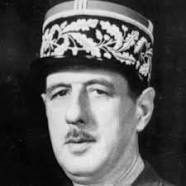 A good example of French grandeur and honneur is Charles de Gaulle. Churchill and Roosevelt were not very fond of him, but could not ignore him. De Gaulle embodied France, and hence was grandeur and honneur. The Dutch often want to save their skin and their trade, for the French honour comes first, l’honneur! It has often made them arrogant in the eyes of others. The French armament industry, la Force de Frappe (French nuclear bombs), their permanent seat in the United Nations Security Council, they are all stakes to save French honour (l’honneur) in this Anglo-Saxon dominated world.
A good example of French grandeur and honneur is Charles de Gaulle. Churchill and Roosevelt were not very fond of him, but could not ignore him. De Gaulle embodied France, and hence was grandeur and honneur. The Dutch often want to save their skin and their trade, for the French honour comes first, l’honneur! It has often made them arrogant in the eyes of others. The French armament industry, la Force de Frappe (French nuclear bombs), their permanent seat in the United Nations Security Council, they are all stakes to save French honour (l’honneur) in this Anglo-Saxon dominated world.
8th Clue: Reuben, jealous of Ephraim
And now thy two sons, who were born … before I came unto thee into Egypt, are mine; Ephraim and Manasseh, even as Reuben and Simeon, shall be mine (Gen 48:5).
And the sons of REUBEN the first-born of Israel (for he was the FIRST BORN; but, forasmuch as he defiled his father’s couch, HIS BIRTHRIGHT WAS GIVEN UNTO THE SONS OF JOSEPH the son of Israel; and the genealogy is not to be reckoned after the birthright. For Judah prevailed above his brethren, and of him came the prince; but the BIRTHRIGHT was Joseph’s), the sons of Reuben the first-born of Israel: Hanoch, and Pallu, Hezron, and Carmi (1 Chron 5:1-3).
Reuben was the firstborn and from Judah came a prince, and later the Prince, but Ephraim (England) and Manasseh (USA), the sons of Joseph (Anglo Saxon nations), got the birthright of the firstborn.
They received the great blessing of national prosperity, the best parts of the earth and the (sea)gates of their enemies. They received the blessings of national greatness promised to Abraham, Isaac and Jacob.
Without knowing the above we see that French history and French spirit are dominated by jealousy towards England since the Hundred Years’ War (1339 – 1453).
Again and again France tries to be the head (Louis XIV , Napoleon, Napoleon III), and again and again England prevails.
Since 1815, since the battle of Waterloo, they have not waged war anymore against each other . Many times they have been allies over the past two centuries . In contrast the French were at war with the Germans (Prussians) three times in 75 years, 1870-71; 1914-1918 and 1939-1945.
One would expect a bigger dislike for Germans than for English – who helped them out twice against the Germans! – but no! There is a lot of French envy and jealousy towards the English. The Reuben – Joseph relationship between the French and the English puts these things into perspective .
9th Clue: Reuben, excellent, superieur
Reuben, … my might, and the beginning of my strength, the excellency of dignity, and the EXCELLENCY of power (Gen 49:3, KJV)
Reuben, … my might, and the beginning of my strength; The pre-eminence of dignity, and the PRE-EMINENCE of power (Gen 49:3, ASV).
Reuben! … My power, and beginning of my strength, The abundance of exaltation, And the ABUNDANCE of strength (Gen 49:3, YLT).
There is a lot af strength , might, intelligence, superior thinking , among the French. In this clue I want to stress the positive sides of Reuben’s excellence , dignity and pre-eminence. First of all there are French literature, art, sculptors and scientists.
French writers and thinkers
As far as French writers , thinkers and philosphers are concerned, let me just name a few: Descartes, Montesquieu, Voltaire, Rousseau, Diderot, Zola, Sartre, Victor Hugo, Camus, Moliere, Baudelaire Flaubert, etc.
Metric System
Geniality is often found in simple and plain things. The French metric system is an example of that. From 1790 to 1798 a committee of mathematicians and physicists designed the metric system for the French revolutionary government.
Every country had its own pounds, ounces and miles, not in alignment with each other, and with complicated measurements. One British pound of 1969 was 20 shillings and each shilling was 12 pence, so there were 240 pence to the pound.
There were 12 inches to the foot and I have forgotten about yards, furlongs and miles. Just try to calculate the surface of something .
During the French revolution the French came with a system based on the 10, the decimal system, in which the next measure was tenfold the first: 10 millimeter was 1 centimeter, 10 centimeter was 1 decimeter, 10 decimeter was 1 meter and 1000 meters was 1 kilometer. On top of that there was a perfect link to weights and cubic sizes. One cubic decimeter of water was 1 liter, weighing 1 kilogram. Super simple and genious at the same time! The Anglo-Saxon nations resisted the metric system for about 150 years , but most of them have given in … except for yards and miles in traffic.
Other benefits of French history are the Napoleonic Code or Civil Code. Since then we have separation of Church and State and a bureaucratic registration of births, deaths and marriages, and a compulsary first name and family name for everyone. In the wake of the French Revolution Napoleon conquered Europe. In 1815 he lost it all and France was cut back to pre-Napoleonic times. The French left. However, much of the Code Civil stayed and the metric system conquered Europe.
Departements
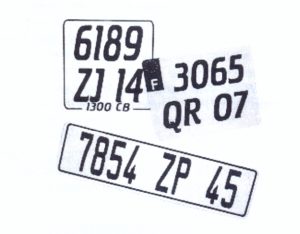 Another smart system is the way departments are numbered. Nearly all departements are named after rivers and mountains. In this way one learns the mountains and rivers along with the departments , as they are alphabetically ordered. Ain becomes 01, Bouches du Rhone (Marseille) 13, Nord (Lille) 59, Rhone (Lyon) 69, Seine (Paris) 75. The numbers of the departments are also the postal codes, so Paris is 75000. The arrondissements make up the final two figures, 75014 is the 14th arrondissement within Paris, 75000. On top of that the final two figures of motorcar numberplates are the number of the departement (and postal code). A car with 1234 AB 59 comes from le Nord, 1234 ABC 75 comes from Paris en 6789 XV 69 from le Rhone, so from Lyon. A bit complicated for foreigners, but very simple and ingenious for the French.
Another smart system is the way departments are numbered. Nearly all departements are named after rivers and mountains. In this way one learns the mountains and rivers along with the departments , as they are alphabetically ordered. Ain becomes 01, Bouches du Rhone (Marseille) 13, Nord (Lille) 59, Rhone (Lyon) 69, Seine (Paris) 75. The numbers of the departments are also the postal codes, so Paris is 75000. The arrondissements make up the final two figures, 75014 is the 14th arrondissement within Paris, 75000. On top of that the final two figures of motorcar numberplates are the number of the departement (and postal code). A car with 1234 AB 59 comes from le Nord, 1234 ABC 75 comes from Paris en 6789 XV 69 from le Rhone, so from Lyon. A bit complicated for foreigners, but very simple and ingenious for the French.
The French have a lot of high technology, just think of the French armament industry. The five biggest arms exporters in 2010-14 were the United States, Russia, China, Germany and France.
www.diplomatie.gouv.fr/en/french-foreign-policy/
With 5,000 companies and 400,000 jobs in the defence sector (165,000 of which directly involve armaments), French manufacturing accounts for over a quarter of European capacity…
The French defence industry, whose main companies – Dassault Aviation , DCNS, EADS, MBDA, Nexter, Safran, Thales – are European and even world leaders, can be seen at international arms trade shows, the Paris Air Show in le Bourget, Eurosatory, Euronaval and Milipol, which attract hundreds of thousands of visitors to France.
Reuben, France, has an abundance of strength, excellency of dignity and power.
10th Clue: Reuben, Gad & Manasseh
And Moses gave unto them, even to the children of Gad, and to the children of Reuben, and unto half the tribe of Manasseh the son of Joseph, the kingdom of Sihon king of the Amorites, and the kingdom of Og king of Bashan, the land, with the cities thereof in the qoasts, even the cities of the country round about (Numbers 32:33).
With whom the Reubenites and the Gadites have received their inheritance, which Moses gave them, BEYOND JORDAN eastward, even as Moses the servant of the LORD gave them (Joshua 13:8).
And when they came unto the borders of Jordan, that are in the land of Canaan, the children of Reuben and the children of Gad and the half tribe of Manasseh built there an altar by Jordan, a great altar to see to (Joshua 22:10).
The Trans-Jordan Tribes
The Trans-Jordan tribes have a special relationship with each other, due to their geography and their history (Joshua-Judges) .
They showed great independence by wanting to live outside the original borders of the Promised Land (Num 20:24; 32:7), and also in their construction of the Great Altar (Josh 22). Because of the River Jordan in the low Jordan valley these tribes were relatively ‘far away’ from the other tribes. They were frequently subjected by Moab and Aram .
This being ‘far away’ from the other tribes, this independence, can be noticed among all three tribes today. The USA (Manasseh) suffers from regularly returning isolationism, and today (written in 2003, invasion of Iraq) they operate mainly by themselves on the world stage. We dealt with France’s (Reuben) obstinate and independent attitude in world politics (think of its role in NATO). Switzerland (Gad) is so independent, that they did not even want to be a member of the United Nations for 45 years. None of these three are monarchies, all three of them are republics.
Reuben – Manasseh
There is a special bond between Reuben and half-Manasseh and we see this in the special relationship USA-France. The American Declaration of Independence is based on French writers, like Montesquieu. French intellectuals were a source of inspiration for the American Revolution {1776-1783}. That revolution with its writings was an extra impetus for the French Revolution of 1789. This last degenerated into the Reign of Terror.
There remained a bond between the two countries. In 1803 Napoleon sold the last French possessions, the Louisiana Purchase, for 15 million dollars to the United States. The area included the whole mid-west, from New Orleans to the south of Canada and was bigger than the existing United States at the time.
The United States remained anti-English and pro-French, for in the War of 1812-1815, they fought at the side of Napoleon … against England. With the Louisiana Purchase quite a few French had become American, as Frenchmen had settled in the crescent from Quebec to New Orleans: Quebec, Trois Rivieres, Montreal, Detroit (d’etroit), Terre Haute, Dubuque, Des Moines, Saint Louis, Beaumont, Baton Rouge, la Nouvelle Orleans.
Statue of Liberty
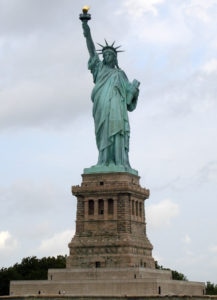 To emphasize the bond between the two nations, the French made and gave the Statue of Liberty to the USA soon after the Centennial of the USA. They kept a 11.5 meters high copy which is in front of a bridge in the River Seine in Paris.
To emphasize the bond between the two nations, the French made and gave the Statue of Liberty to the USA soon after the Centennial of the USA. They kept a 11.5 meters high copy which is in front of a bridge in the River Seine in Paris.
In World Wars I and II the Americans came twice to the aid of France and on top of that France received a lot through the Marshall Plan. French may resist Coca-Cola, McDonald’s and other americanising trends, but yet many French (Reuben) have a weakness for Americans (Manasseh). When they have to, many prefer speaking American English to British English.
Bert Otten, Gouda,
Holland (les Pays Bas)
Dutch Original: 2003 and 2012
English Version: 2015


